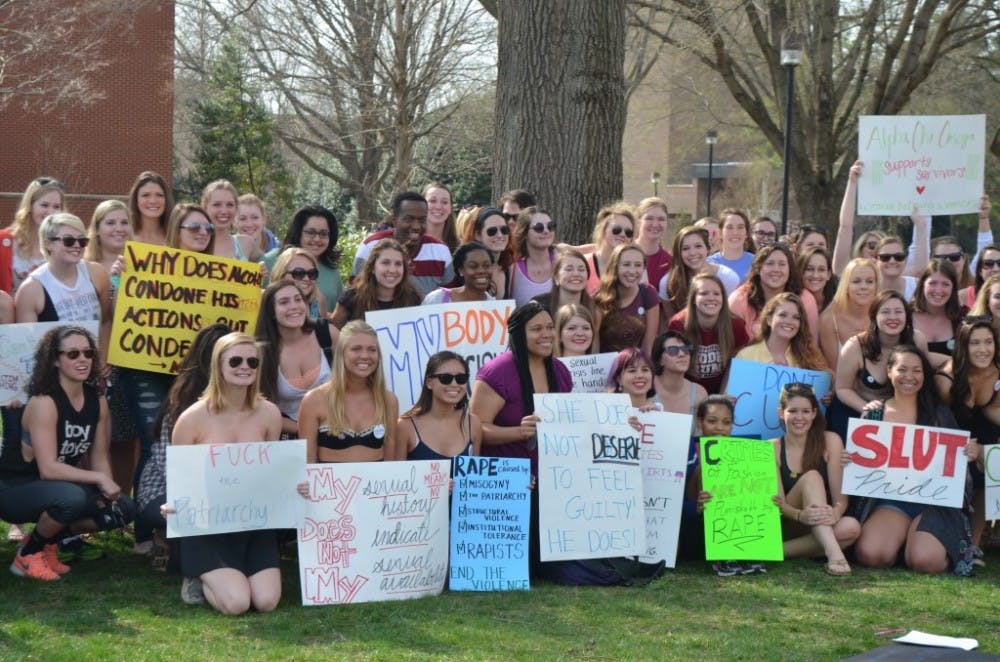Chants of, “Yes means yes; no means no” echoed around campus April 3 as Elon Feminists for Equality, Change, and Transformation (EFFECT) led the university’s first Walk Against Victim Blaming. The walk was part of a weeklong effort to raise awareness of such issues on campus and in the world.
Girls came dressed in gym clothes, party clothes or clothes they had worn to class. They gathered at Speaker’s Corner late that afternoon with homemade signs to amplify their belief that women do not provoke sexual violence based on what they wear.
“It’s time for women not to feel guilty anymore,” freshman Emily Collins said. “I’m sick of women being labeled.”
The walk was the final event of Support Survivor’s Week sponsored by EFFECT. Co-president Rachel C. Lewis said that the point of the walk was to fight the narrative that women are “asking for it.”
“We wanted to show survivors that they have support in a loud and vibrant way,” she said.
The event drew support from a variety of organizations from Greeks to Spectrum to Campus Security and Police.
EFFECT kicked off Support Survivor’s Week with a whiteboard campaign at College Coffee where students, faculty and staff wrote why they support survivors and had their pictures taken.
Junior human services studies major Lauren Berk presented the idea for the photo campaign to other members of the organization. She said she embraced the project as her “baby.”
“It’s so simple and so powerful,” Berk said.
The day after College Coffee, the Department of Health Promotion taught students how to support survivors through a workshop.
Both Berk and Lewis said they received overwhelming support from student organizations, faculty and staff. Even President Leo Lambert posed for a photo for the whiteboard campaign.
“I have gotten so much positive feedback from students, faculty and staff about the events we hosted,” Lewis said.
But even with the overwhelmingly positive response to EFFECT and its campaign, sexual violence remains a problem on college campuses across the United States, including Elon.
Only 5 percent of college women who experience sexual violence will report it, and 40 percent will never tell anyone that they have been sexually assaulted, according to Rebecca Bishopric Patterson, coordinator for health promotions at Elon.
Patterson said that changing the language used with sexual assault can help change the culture. For example, according to Patterson, the word “survivor” is a more empowering label for people.
“It helps them feel more supported,” she said. “Sometimes it’s all someone is looking for.”
And that is what EFFECT’s leaders have hoped to communicate on campus through Support Survivors Week and throughout April, which is Sexual Violence Awareness month.
“Admitting you’re a survivor is a big step,” Lewis said. But she does not believe Elon has a supportive culture around the issue.
EFFECT wants to transform this aspect of university culture. It has increased its activity on social media, held feminist dinner parties, and partnered with the Gender and LGBTQIA Center and Alpha Xi Omega for their annual Walk a Mile in Her Shoes.
Even with widespread participation from student organizations, Zeta Beta Tau was the only fraternity that participated in the walk. Lewis said it proves the lack of male involvement in volunteer roles on campus.
“I don’t know what exactly it will take to push Elon men to step forward,” she said. “But I hope that over time we can figure it out.”


